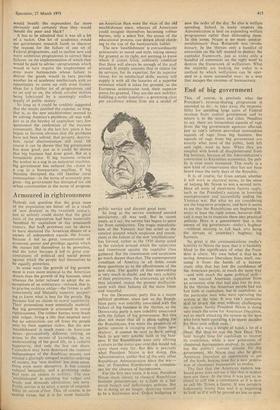End of big government
This, of course, is precisely what the President's revenue-sharing programme is intended to do : to take away the responsi- bility for spending large sums of Federal revenue from central government and to return it to the states and cities. Needless to say, there are tremendous squeals of rage from the big government agencies affected. just as FOR'S reform provoked tremendous squeals of rage from big business. But squeals of rage from big government are exactly what most of the public, both left and right, want to hear. When they are coupled with howls of disappointment from big business, because of the Administration's conversion to Keynesian economics, the pub- lic is even more reassured. This really is a new kind of conservatism that has not been heard since the early days of the Republic.
It is, of course, far from certain whether it will work in electoral terms, in the sense of helping Mr Nixon to win a second term. Here all sorts of short-term factors apply, such as the Presidents success in lowering unemployment and successfully ending the Vietnam war. But what we are considering are the long-term prospects, and here it seems to me that the Republicans are beginning to make at least the right noises, however diffi- cult it may be to translate them into practical policies. Here is a government that is the enemy of big government—today's bugbear —without seeming to fall back into being the servant of yesterday's bugbear, big business.
So great is the communications media's hostility to Nixon the man, that it is foolishly blind to the significance of what the Presi- dent is about. My own belief is that he is saving American liberalism from itself, res- cuing it from the hands of a bureau- cratic elite that has lost the confidence of the American people, in much the same way —and with much the same political skill— as FOR rescued American capitalism from an economic elite that had also lost its way. In the 'thirties the American people had not lost faith in capitalism, but in capitalists; in the particular men who were operating the system at the time. It was Foil's particular skill to attack the men without challenging the system. Surely President Nixon is doing very much the same for American liberalism, not so much attacking the system as the men who have been operating it in recent decades for their own selfish ends.
It is, in a way, a sleight of hand, a bit of a cheat. But then so was the New Deal. The later bought time for capitalism to recover its confidence, while a new generation of chastened businessmen evolved. In articulat- ing the public's current distaste for big government, Mr Nixon may also, be given American liberalism an opportunity to get off the hook, buying time for a new genera- tion of chastened bureaucrats to evolve.
The fact that the American eastern sea- board press does not sec it like that is neither here nor there. At the time it n
was just as in to call FOR a communist as it is now to call Mr Nixon a fascist. It was certainly ludicrously wrong then and it is beginning to look as if it will be proved no less so now.










































 Previous page
Previous page